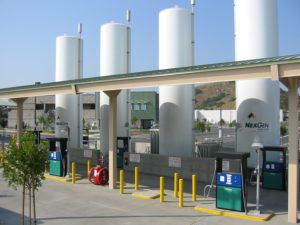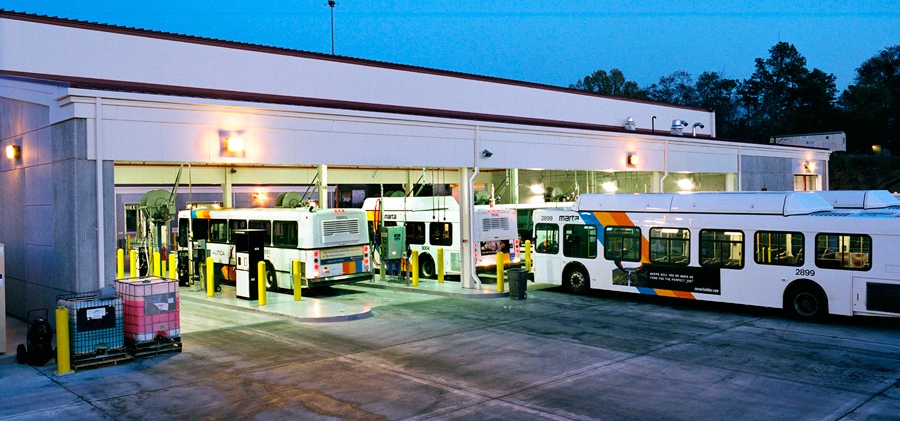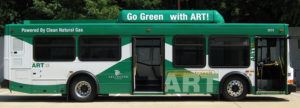For the past two decades, in cities all over the world, we seen city buses proclaiming that they were running on “clean natural gas”. While it’s certainly true that natural gas reduces particulate pollution, any implications that it’s “clean” as regards climate change is pure fossil fuel industry propaganda.
And it’s not just our atmosphere that is being polluted: all across the globe, aquifers are being permanently polluted by toxic fracking fluids. Five thousand years from now, our descendants will still be cursing us for this criminally-irresponsible action.
The good news is that a switch is underway from climate-destroying natural gas to climate-restoring renewable natural gas. Los Angeles buses will increasingly use biogenic gases (“biogas”) from 100% organic waste. Now, transit vehicles will not only stop killing local residents by injecting toxic particles into the air, they also won’t kill future generations by contributing to climate change.
On June 22, 2017, the Los Angeles County Metropolitan Transportation Authority (Metro) voted to purchase 295 40-foot compressed natural gas (CNG) buses, which will be fueled by renewable natural gas (RNG). The contract includes an option for the purchase of 305 additional 40 foot CNG buses. The buses will replace part of the aging bus fleet and signals a commitment by the transit agency, already the largest natural gas bus fleet in the nation, to continue using natural gas to improve air quality and reduce greenhouse gas emissions in Los Angeles County.
“Transit agencies around the nation continue to realize the benefits of renewable natural gas,” said Dr. Kathryn Clay, interim director of NGVAmerica. “Diesel emissions continue to plague our environment, especially in cities like Los Angeles. But together, with the leadership from agencies like LA Metro, we can use natural gas powered vehicles to clean up the air and the environment in and around our communities today.”
 “We take our responsibility to both the environment and taxpayers very seriously,” said Cris B. Liban, Metro Executive Officer for Environment and Sustainability. “By using renewable natural gas, as well as other technologies, we will continue to exceed our environmental goals and ensure we provide the best transportation service to our customers and region.”
“We take our responsibility to both the environment and taxpayers very seriously,” said Cris B. Liban, Metro Executive Officer for Environment and Sustainability. “By using renewable natural gas, as well as other technologies, we will continue to exceed our environmental goals and ensure we provide the best transportation service to our customers and region.”
LA Metro will vote on a similar purchase of buses at their board meeting next month. The commissioners will be looking at purchasing additional CNG and other alternative fuel vehicles to upgrade their fleet.
In addition to the purchase of these new buses, LA Metro will also begin retrofitting and replacing their buses with the new Cummins-Westport Low NOx CNG engines that reduce smog-forming NOx and GHG emissions that are 90% lower than the EPA NOx limit.
“This engine gives our customers the most affordable path to zero-equivalent emissions and the benefits of performance and reliability described by California’s South Coast Air Quality Management District as equivalent to an electric vehicle,” said Rob Neitzke, president of Cummins Westport.
Previously, LA Metro awarded a contract to Clean Energy Fuels Corp., a renewable natural gas (RNG) contract to fuel its fleet of transit buses. The deal calls for Clean Energy to provide Metro its Redeem™ brand of RNG, the first renewable and commercially available vehicle fuel made entirely from 100% organic waste.
Over the five-year period, the transition to RNG will reduce Metro’s greenhouse gas (GHG) emissions by over 520,000 metric tons over the use of regular natural gas and by almost 900,000 metric tons over the use of diesel. Redeem is derived from biogenic methane or biogas, which is methane that is naturally generated by the decomposition of organic waste. The methane gas is then processed, purified and sent into the interstate natural gas pipeline and transported to Clean Energy’s and its customers’ stations.
In response, the California Natural Gas Vehicle Coalition, SoCalGas, and Clean Energy proclaimed that the vote was “an important move in the fight to improve the region’s air quality. We applaud this action and view it as a critical step in ensuring that MTA remains the model for innovation and environmental leadership among public transit agencies nationally and abroad. This decision is a win for the residents of Los Angeles County, who – for far too long – have had to endure some of the worst air quality in the nation.”
“By authorizing the purchase of zero-equivalent buses and fueling them with renewable natural gas, MTA will deploy game-changing, cutting-edge technology that can reduce exhaust emissions by as much as 98 percent when compared with MTA’s current buses. When accounting for the amount of coal-fired electric generation in large areas of the grid where MTA operates, buses powered by renewable natural gas can register even lower emission levels than a 100 percent battery bus,” the industry groups added.
“MTA staff confirmed in two separate board reports over the past 18 months that zero-equivalent buses fueled by 100 percent renewable natural gas would be most effective at reducing in-basin particulate matter, total carbon dioxide emissions, total greenhouse gas emissions, and total NOx from Metro’s fleet over the next 40 years as compared to transitioning to either electric or fuel cell buses. We support MTA’s leadership in procuring cutting-edge bus technology that will significantly improve regional air quality and save local taxpayers hundreds of millions of dollars,” the joint statement concluded.
All images courtesy of NGVAmerica.


